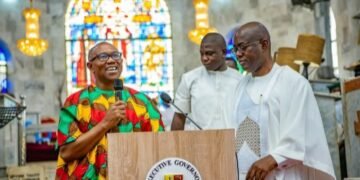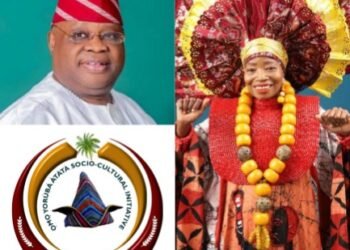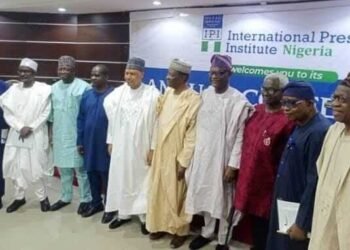Book Review
Author: Chief Remi Oyeyemi
Book Title: Asiwaju Olayinka Fasuyi: The Passion of a Patriot
Year of publication: 2025
Publishers: Safari Books Limited, Onireke, Ibadan
Book Reviewer: ‘Wale Sadeeq, PhD
This 206-page and 13-chapter book authored by a veteran journalist, Chief Remi Oyeyemi, the Bobagunwa of Imobi-Ijesa, is the latest addition to the growing literature on both autobiographies and biographies of eminent personalities in our society, particularly in Ijesaland.
The putting together of this compendium, in the words of the author, is “to situate Asiwaju Olayinka Fasuyi within the continuum of recent development efforts in Ijesaland and record, for posterity, his pathfinding role” as well as “a documentation of Asiwaju’s roles in the recent wave of development in Ijesaland.”
This attempt at chronicling the life and times of this prominent Ijesa son will, without mincing words, not only be beneficial to the author as it will have his name immortalised but also provide an ample opportunity for the younger generation the Asiwaju story and learn from his life of service to Ijesaland in particular and humanity in general.
And, of course, the author thought right because there is a limit to human memory, especially if not put in black and white. Hence his apt reference to Burke’s admonition to “look forward to posterity” to remind us of the enduring importance of documenting and celebrating the contributions of leaders for generations yet unborn, just as it also compels us to “look backward to the ancestors,” to trace the influences of family, mentors, education and career on Asiwaju Olayinka Fasuyi’s outlook, just as he stress the need for chronicling his leadership role in the recent development efforts, not only for his people, but also for the Yoruba nation and indeed, the wider world.
It is therefore not surprising that the author decided to deliberately defy the usual chronological order of starting a biography from the family lineage, birth, childhood or formative years of the person on which it is being written. Rather, he chose to begin with the palace of the Owa Obokun Adimula project, a landmark intervention which is symbolic of the rebirth of communal confidence, albeit without forgetting Asiwaju’s background, family influences, education, career, marriage and leadership trajectories, not as a separate narrative but as context to help the reader understand the deep-seated passion that drives his lifelong commitment to community-driven development.
The author dedicates the first chapter of the book, entitled: “The First Challenge: The Palace of Owa Obokun Adimula”, to the pivotal role which Asiwaju played in the building of the new, modern and befitting palace of the Owa Obokun Adimula after three previous unsuccessful attempts. The rebuilding of the palace was necessitated by the condition of the building which, by all standards, was not only unbefitting for the paramount ruler but also fell short of the dignity and heritage of Ijesaland.
Needless to say that Asiwaju’s anxiety was fired by the challenge thrown at him by His Imperial Majesty, the late Oba Adekunle Aromolaran, during his installation as the first Asiwaju of Ilesa on Saturday, 22nd October 2016, to build a new palace for the Owa Obokun Adimula.
As a demonstration of his avowed commitment to the cause of Ijesaland, Asiwaju Fasuyi, in 2017, first introduced a bursary scheme for students of public secondary schools who were writing the Senior Secondary Certificate Examination (SSCE), conducted by the West African Examinations Council (WAEC), in the six local government areas in Ijẹ̀ṣàland, a scheme which tremendously added value to the lives of the beneficiaries.
It is to his eternal credit that he supervised the building of the new palace, rallying members of Ijesa Development Association, both at home and in the Diaspora, to raise a whooping ₦363 million. From the groundbreaking on March 9, 2020, the structure rose steadily and was fully completed by November 11, 2020, with the grand commissioning following on Saturday, December 26, 2020.
According to the author, this was not merely a construction achievement; it was a testament of faith, vision and unity, crowned with unmistakable divine favour. It was equally a demonstration of probity, project leadership commitment, absolute transparency in project’s operation and ultimately, accountability which culminated in the surplus of ₦36 million after the completion of the palace and making dedicated provision for its maintenance becoming the seed fund for the Ijesaland Geriatric Centre, a fitting continuation of the culture of service and development that defined the palace project.
The Ijesaland Geriatric Centre, as contained in the third chapter, was a product of the power of will by Asiwaju Fasuyi. He assembled a three-member Technical Advisory Committee (TAC), under the chairmanship of a former Minister of Health and former Vice-Chancellor of University of Ibadan, Professor Isaac Folorunso Adewole, to provide technical support and advise on the segment of healthcare that the project should prioritise, for maximum impact.
Other members of the Professor Biodun Ilesanmi, a former Chief Medical Director of University College Hospital (UCH), Ibadan and erstwhile Chairman of the Committee of Chief Medical Directors of Federal Teaching Hospitals as well as Professor Oyewusi Gureje, Africa’s foremost scientist in Psychiatry and globally-acclaimed authority in his field.
The centre, fully equipped with medical equipment, furniture and fittings upon completion, was officially commissioned on Thursday, March 31, 2022, with an impressive ₦109 million surplus and an additional ₦24 million separately earmarked for its maintenance.
It was indeed the back-to-back delivery of these two monumental community projects – the Owa Obokun Adimula Palace and the without any financial or material support from any tier of government, was what finally convinced the former governor of Osun State, Chief Adegboyega Oyetola, to heed the passionate calls of the Ijesa people and approve the upgrade of the defunct Osun State College of Education, Ilesa, to a full-fledged University.
That historic announcement, made at the hospital commissioning on 31st March, 2022, marked the birth of the University of Ilesa, the first university in Ijesaland. Faith truly makes the impossible possible and unity makes it unstoppable.
The second chapter delves on the family background of Asiwaju Fasuyi, beginning with the business acumen and the undying spirit of his father, Chief Jacob Olowookere Fasuyi, a man whose illustrious exploits earned him the sobriquet: “Oke Baba Okuta” (the Hill that Supercedes the Stone), which forms the title of the chapter, thus encapsulating courage, resilience and perseverance in the face of the vicissitudes of the business world of the Osomaalos, with its special variation of turbulence.
The famous Chief Jacob Olowookere Fasuyi of the renowned Ereja Square, whose business traversed many Yoruba towns, was elected as the National Patron of the Ijesa Osomaalo, hosting an annual party for the Osomaalo giants and chieftains.
He was, however, not without his ups and downs in the business world, as he lost 13 lorries in his transport business. It was indeed a harrowing era in his life trajectory which, ordinarily, could have permanently incarcerated the courage of others and incapacitated the will and determination of many.
The Osomaalo, who had been written off by many on account of this experience, however, climbed the valleys of economic tribulations up to the flatlands of business stability as a prelude to the new heights of prosperity. It is on record that he also had his foray into local politics, earning him the position of a National Leader in the defunct National Council for Nigeria and Cameroon (NCNC), with it his conferment of the Aṣhípá of Holy Trinity Church, Ọmọfẹ, Ilesa, in demonstration and justification of his wealth and affluence in the society.
Chief Olowookere must have inherited industry and hard work from his own father, Pa Fasuyi Anjorin Fatuwase a notable and multi-talented artist, sculptor, bead maker, bronze caster and blacksmith who made a name for himself and was very comfortable from his trade. Indeed, Pa Fasuyi Fatuwase belonged to the generation of those successful Ijesas who pioneered the construction of multi-storey buildings commonly called “upstairs buildings” in the 1890s.
Asiwaju Olayinka Fasuyi, the 13 of the 23 children sired by his father, watched his father, Chief Olowookere, as he managed the turbulence of affluence. He also watched and lived through the experience of how the sweetness of wealth and comfort could go sour and be replaced with the looming threat of failure. Asiwaju equally watched his father luxuriating in his trajectory of success and managing the challenges thrown at him and the fluctuations of life as he lived among his seven wives.
Olayinka’s ‘ freshly-minted’ mind which the author referred to as his tabula rasa watched how his father lived and thrived, how he acted as a leader, playing a key role in facilitating the selection and installation of an Ọwa Obokun of Ijesaland as well as how other powerful elements paid to his father. He watched his father resuscitate his business, as he bounced back from the rocky valley and how his beloved dad trudged through the stone to rise from economic comatose. He was not just taking everything in, he got enormously impressed and inspired, thus shaping his upbringing, mindset, relationship with people and general disposition towards life and humanity.
Asiwaju Fasuyi is the third child of the six children of his mother, the late Madam Felicia Sijuwola Fasuyi, a successful business merchant and daughter of the late Chief Komolafe Farinloye, the renowned Chief Priest to the Ọwa Obokun Adimula, Ọba Oduyomade Aromolaran I who reigned from 1920 to 1942, who was installed as the Ṣegbua of Ilesa by Ọba Aromọlaran I in 1933. His experience living with Chief Komolafe Farinloye, his maternal grandfather for about 10 months also had its own impact in the life of little Olayinka, as it opened his eyes to the spiritual powers of the Yoruba people.
Olayinka’s mother, Sijuwola, was a perfect study in humility and a strong lady. Her humility was a perfect cocoon for her inner strength, her quiet determination in the face of any adversity and her clarity of where she was headed served her in an excellent stead. “Ìyá Aláṣọ”, as she was popularly referred to, was the darling of everyone, young or old. Even though in every polygamous family, the tendency for competition was a given one, however, “Ìyá Aláṣọ,” would not simulate this.
All the children in the family were her children, regardless of whom the mother was. She was always there for everyone. Everyone and anyone depended on her for support in times of need. She was always reliable and dependable. She was seen as loyal, trustworthy and rocklike. In fact and, indeed, many children of the other wives came to believe in her and made her their confidant. Her peaceful disposition endeared her to many and many in the family cannot remember when she was involved in any verbal altercation with anybody. She treated the older wives with deference and respect. The younger one was not treated differently too.
Without mincing words, whatever Aṣiwaju Ọlayinka Fasuyi might have become today is a reflection of the nature of his environment while growing up. His encounter with the vagaries of different personalities, his relationship within the family with his parents, grandparents, siblings (Deaconess Mobolaji Abeke Ojo (now late), Mrs Florence Folaju, Mrs Omolola Oladeji, Chief Oladejo Akanni Fasuyi (late) and Mrs Olusola Coker) and half-siblings formed the totality of the experience that shaped his personality and worldviews. It should, however, be stated that his socialisation process was not limited to the family.
And just the author rightly noted, when a human being traverses the world, he would encounter the plain grounds, the valleys and the mountains. All of them will pose different challenges, test him, teach him and imbue him with the skill set to further advance him to his destiny. He would encounter nature as it were and come off comprehending some things that would form the fundamental variables of his own unique character. This appears to be exact picture of Olayinka Fasuyi’s life metamorphosis. Thus, it was not a strange experience for him to go through the mills of nature in different measures and in as many ramifications in his formative years.
From his halcyon days of bumbling and bubbling as an infant of Madam Sijuwola, his mother, Chief Olowookere, his father, and other members of the family, through the brief sojourn with his maternal grandfather, Chief Komolafe Farinloye, the Ṣegbua of Ilesa to his days at Otapete Methodist Primary School in Ilesa and his epoch at the historical Ilesa Grammar School, Asiwaju’s life was shaped.
Asiwaju Olayinka Fasuyi started his elementary education at the famous Otapete Methodist Primary School, Otapete, Ilesa in 1962 and was there until 1968 where he made friends with people like Ropo Siyanbola, Ayinde Ajewole, Ishola Tanimowo, Oladapo Fasuyi and Yínka Familusi, a friendship that still endures till today. He could also not but remember Mr D.D. Layinka who taught him in Primary Four who he defined as a divine gift owing to the ‘most positive impression’ that he left on his mind as well as Mr David Odeyemi Ajibade, the headmaster, who was regarded as a “special creature” because of his affection for all. In 1969, Ọlayinka Fasuyi gained admission into Ilesa Grammar School for his secondary education, full of promise and energy.
Like many teenagers, Asiwaju Olayinka Fasuyi was drawn to the excitement of youth, friends, parties, and the allure of living big. With easy access to his father’s resources, he sponsored gatherings and cultivated a flamboyant lifestyle that earned him the nickname “Young Millionaire.”
However, a turning point occurred in the life of Olayinka, when he relocated to Lagos to live with his older siblings. Unlike in Ilesa where he was looming large as a “Young Millionaire”, life in Lagos meant stricter conditions and limited access to money. His siblings, wary of his reputation, hesitated to take him in, fearing his youthful indulgence might influence their children. Only one brother, Emmanuel Olatunde Fasuyi, chose to take a chance on him despite his limited means, and it was from him, coupled with his father, that he got the mentorship and counselling that eventually shaped his life.
When his secondary school results were withheld, rather being despaired, Olayinka chose a harder, lonelier path. Rising before dawn each weekday, he made his way to the Central Library at Ọdunlami, Palm Grove, where he devoted long hours to study, resulting in his passing with distinction, a feat that stunned his siblings and a proof that perseverance triumphs where privilege fails. This success opened new doors.
With the help of his sister, Chief (Mrs) Olufunke Omoniyi, Ọlayinka secured his first job at the Ministry of Finance before later joining the National Electric Power Authority (NEPA). Still, his hunger for knowledge pushed him to the Federal School of Arts and Science (FSS), Ondo to pursue his A’ Levels. Wrongful Accusation and Resilience
The young Olayinka faced another storm as he was wrongly accused of masterminding an attack on his school principal, consequent upon which he was suspended indefinitely. It was a painful blow, the kind that could derail a young man’s future. Yet, rather than surrender, he returned to the Central Library at Ọdunlami Street, Palm Grove, drawing once again on his familiar rhythm of early mornings and long hours of study. Out of this adversity, he forged strength, sat for the exams and passed with success in Chemistry, Biology and Economics, thereby restoring his family’s pride in him.
After completing his A’ Levels, Ọlayinka was employed at the Federal Ministry of Education as an Assistant Stock Verifier, a role he held until gaining admission into the University of Ibadan to study Economics. Determined not to repeat past missteps, he resisted pressure to join the two prominent confraternities on campus, the Pyrates (National Association of Seadogs) and the Buccaneers (National Association of Sealords). Mindful of the dangers of such distractions, he kept his distance.
Olayinka’s path at the University of Ibadan was not without challenges. He initially struggled with the mathematical aspects of Economics and was advised to switch to Sociology or Political Science. Yet, true to his growing character, he refused to give up. Rather, he bore down on his studies with tenacity, conquering what had first seemed insurmountable and he graduated in the 1982/83 session as an Economist. His resilience had carried him through fire, turning each obstacle into a stepping stone.
From there, Olayinka embarked on his mandatory National Youth Service Corps (NYSC) scheme in Yola, then Gongola State, ready to step into the wider world, not as a “Young Millionaire”, but as a man shaped by discipline, perseverance and vision.
The author devoted the eighth chapter, titled “The Peeress Behind the Patriot”, to Dr Olubisi Olufunke Fasuyi, the Yeye Asiwaju of Ijesaland, whom he described as a “woman of substance”, considering her ability to confront many challenges on many fronts and be successful at her endeavours and ability to be a caring and supportive wife and nurturing mother, while slobbering through a satiating career, coupled with the depth of love, affection, dedication, commitment, assiduousness, mutual reliance and devotion she has exhibited towards her husband, Aṣiwaju Olayinka Fasuyi.
Olubisi and Olayinka’s paths first crossed in 1987 at a friend’s bachelor’s eve, when she was in her third year studying Linguistics at the University of Ibadan. The friendship quickly blossomed into love, and on 17th and 18th November, 1989, they got married.
To Olayinka, Olubisi is “a rare gem, visionary leader, woman of grace and grit, a pillar of strength in Ijesaland’s development, selfless and compassionate philanthropist, a trailblazer, a devoted matriarch, dogged advocate and defender of what is just, fair and equitable.” What is more! As the Yeye Asiwaju of Ijesaland, Dr Olubisi Olufunke Fasuyi has played a pivotal role by contributing her resources in support all ICDA development projects that have empowered both men and women as well as the vulnerable, thus transforming the socio-economic landscape of various communities in Ijesaland in particular and Osun State in general.
Yeye Asiwaju, who bagged a doctoral degree in Communication and Language Arts, with specialisation in Development Communication, in 2012 at the University of Ibadan, is, no doubt, the apple of her husband’s eyes, as he holds her in the highest esteem, crediting her for being a devoted and conscientious partner and homemaker, particularly during the many years when his career required frequent travels. Even after he ventured into private practice, she continued to hold the home front firmly, while maintaining her own demanding professional schedule.
Her advocacy for women empowerment to ensure equal representation in leadership, access to opportunities and active participation in development programmes at their respective communities has been recognised and commended by many people and organisations. She has the enviable record of bringing flavour to the lives of a countless number of women through her foresight, resilience and advocacy; she has consistently used her position as the Yeye Asiwaju of Ijesaland to further the course of women in development.
A seasoned communication for development expert, strategic project management and operations executive, skilful facilitator and a committed community leader with almost four decades of cross-sector experience spanning publishing, entrepreneurship, training, consultancy and executive management, Dr (Mrs) Olubisi Olufunke Fasuyi derives pleasure in imparting knowledge to others and, conceiving and communicating strategies for achieving and sustaining organisational goals.
She’s widely recognised for her unwavering commitment to human capital development, sustainable development and transformative leadership, especially through the lens of communication, stakeholders’ engagement, education and empowerment.
With the active support of his wife, Asiwaju Olayinka Fasuyi established the Yinka Fasuyi Foundation (AYFF), a platform dedicated to empowering youth, promoting education and creating opportunities across Ijesaland. And through the foundation’s interventions, examination fees of students of public secondary schools in Ijesaland had been paid, enabling them to sit for the Senior Secondary Certificate Examination (WAEC). It is on record that since its inception, a total of 2,015 students have benefitted from the foundation’s intervention programmes.
Beyond education, AYFF has also prioritised youth empowerment through its Skills-Based Empowerment Programme, with initiatives in both skills acquisition and agripreneurship, with a ₦20 million endowment to the Ijesaland Youth Association, a strategic investment in nurturing commerce and entrepreneurship among young people in the region. These initiatives were not only about creating jobs but about unlocking potential, boosting self-reliance and laying the foundation for long-term socio-economic development.
Asiwaju Olayinka Fasuyi, who can be described as a globetrotter, holds the impressive record of having visited no fewer than 107 countries, spanning all the continents, as at June 2025, reflects his wide-ranging international engagement.
A child of destiny indeed, this is in fulfillment of the prophecy given by his brother-in-law’s friend over 55 years ago, thus surpassing the legendary Nigerian globetrotter, Chief Olabisi Ajala, who is immortalised in a song by the Juju music icon, Chief Commander Ebenezer Obey Fabiyi, Asiwaju’s most preferred musician, for having visited a total of 87 countries during his lifetime.
A man of destiny and product of grace, Aṣiwaju continues to grow in stature and influence, with the cultivation of deeper patience, tolerance and flexibility serving him well, as he recognises the varied temperaments of those he leads, embracing the nuances of his environment and balancing his gift of blunt honesty with gentleness, which, rather than diminishing his leadership, has continued to deepen it.
As the author has rightly put it, leadership is not only about delivering results; it is also about nurturing people and ensuring that the vision outlives the visionary. And this, without gainsaying, is a signpost to the enviable life of Asiwaju of Ijesaland, Asiwaju Olayinka Fasuyi.
Kudos must be given to the author, Chief Remi Oyeyemi, the Bobagunwa of Imobi-Ijesa, for the well-researched and succinct biography of an illustrious son of Ijesaland, Asiwaju Olayinka Fasuyi, with lucid language deployed in the narrations, proving his mettle as a veteran journalist with good command of the English Language.
The book will not only serve as a mean of record keeping to the Asiwaju, it will afford the young generation of Ijesa sons and daughter the opportunity of learning about the reward of service to humanity which the life of Asiwaju Olayinka Fasuyi symbolises.
•Dr. Sadeeq is a Deputy Editor-in-Chief and Head, Politics Desk, News Agency of Nigeria (NAN), Abuja.






























